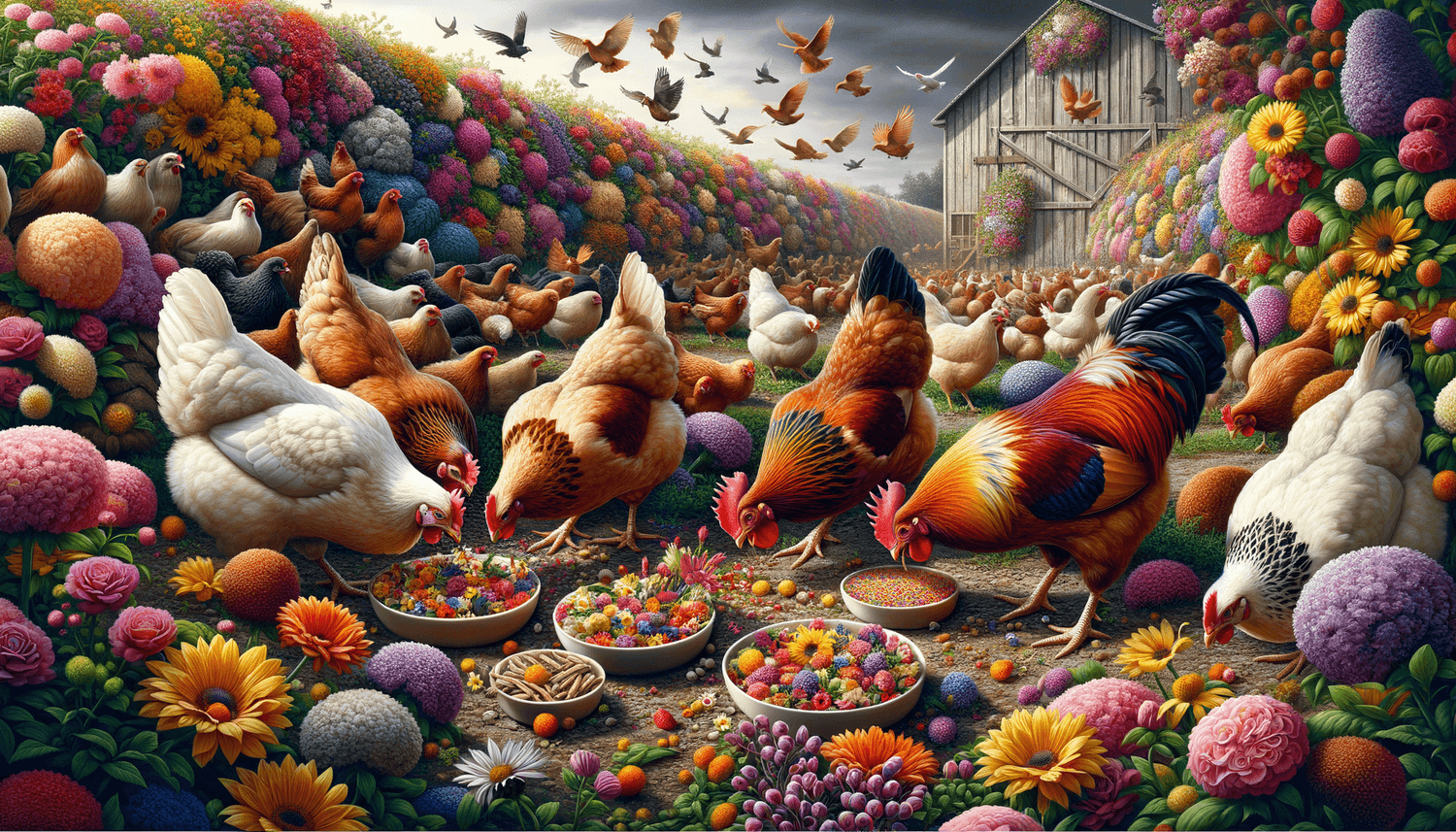For all you blooming backyard chicken enthusiasts out there, we’ve got a petal-packed topic to share with you today! Ever wondered if you can add a splash of colorful flowers to your feathered friends’ daily feasts? Well, we’re diving deep into the garden bed of this topic, exploring whether chickens can safely snack on flowers or not. And as we always strive to nurture our lovely ladies, we’ll touch on the importance of a balanced diet, the benefits and/or risks, nutritional value, and of course, how to prepare these botanical beauties for consumption. So, let’s stroll through the floral wonders and find out if our clucking companions can enjoy a bouquet of tasty treats! 🌸
Can chickens eat flowers?
Yes, chickens can safely eat flowers, as many blossoms are perfectly edible and even nutritious for them! However, it’s important to note that not all flowers are suitable for consumption, as some can be toxic or harmful to your feathery friends. Always ensure you research the specific flowers you wish to feed your chickens to verify their safety, and provide these floral treats in moderation as part of a balanced diet.
A balanced diet for happy hens
Just like humans, chickens require a balanced diet to maintain their health and well-being. A well-rounded diet is essential for them to lay lovely eggs, grow strong feathers, and maintain playful personalities. At the heart of a chicken’s diet should be a high-quality chicken feed, which provides the necessary nutrients, vitamins, and minerals.
Chicken feed should make up approximately 80-90% of their diet. This complete feed will give your clucking companions the energy and nutrition they need to thrive. The remaining 10-20% of their diet can consist of treats like fruits, vegetables, and tasty flower snacks. While treats are a delightful addition to their meals, always remember that chicken feed should remain the cornerstone of their diet.
Nutritional value of flowers for chickens.
Feeding edible flowers to chickens does indeed offer some nutritional value. Many flowers contain vitamins and minerals that can provide health benefits to your flock. For example, marigolds, nasturtiums, and even rose petals are packed with healthy nutrients, such as vitamin A, vitamin C, and beta-carotene, which can help support the immune system and contribute to overall health.
Apart from vitamins and minerals, flowers can provide hydration benefits as well, since they generally have a high water content. This can be especially beneficial during warm weather when chickens may require extra hydration to maintain their internal temperature. Meanwhile, calendula petals are known for their vibrant orange color, which can pass through to the egg yolks, resulting in a rich and more appealing tone.
Finally, it is worthwhile to consider the potential forage benefits when offering edible flowers to your chickens. Encouraging your flock to forage as they hunt and peck around in the garden can help them to satisfy their natural instincts and promote better mental well-being. Including edible flowers throughout their outdoor environment can foster natural behaviors while providing a nutritional boost.
Nutrition table of flowers for chickens.
| Information | Description |
|---|---|
| Nutritional Value | Flowers can provide chickens with vitamins, minerals, and hydration. |
| Suggested Serving Size | Offer flowers in moderation, making up only 10-20% of the chicken’s diet along with other fruits and vegetables. |
| Safe Feeding Practices | Only feed non-toxic flowers and ensure they are pesticide-free. |
| Preparation | Rinse flowers thoroughly, remove any bugs, and cut them into smaller pieces to prevent choking. |
| Potential Risks | Some flowers can be toxic or harmful to chickens, so always verify their safety before feeding. |
| Hydration | Flowers have high water content, which can provide chickens with extra hydration, especially during warmer months. |
| Digestion | Feeding flowers in moderation along with a balanced diet aids in healthy digestion. |
| Seasonal Availability | Flower availability may vary depending on the season and region, so incorporate seasonally-available flowers in chicken diets. |
| Other Benefits | Encourages foraging behavior in chickens, promotes mental well-being, and can enhance egg yolk color. |
Edible flowers to consider
Now that you’re aware of flowers being a potentially nutritious and delightful treat for your chickens, let’s look at a few examples. Popular edible flowers include calendula, nasturtium, roses, sunflowers, and lavender. These flowers not only have nutritional benefits, but they also add variety to your chickens’ diet, keeping them satisfied and entertained. However, please ensure they have not been treated with harmful chemicals or pesticides before feeding.
Flowers to avoid
While many flowers are perfectly safe for chickens, it’s essential to be aware of the ones they should not eat. Toxic flowers such as foxglove, morning glory, and delphinium should be avoided, as they can cause digestive issues or even pose more severe health risks. Always research the flowers you plan to feed your chickens, and when in doubt, consult an expert or avoid feeding the unknown flower altogether.
Foraging tips
Encouraging your chickens to forage for flowers not only keeps them entertained but also promotes mental and physical well-being. Distribute a variety of edible flowers throughout their enclosure and even hide some in areas where they’ll have to work a bit harder to find them. This foraging activity will give your chickens the chance to stretch their muscles, use their senses, and mimic their natural wild behavior.
Remember, incorporating flowers into your chickens’ diet can greatly enrich their lives and well-being. As long as you follow safe practices and maintain a balanced diet, your feathery friends will be clucking happily as they enjoy their floral treats!

















